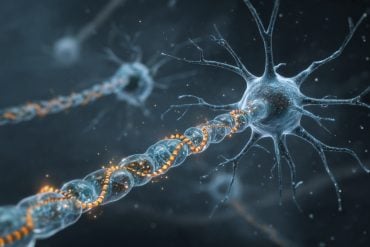Summary: Rats fed on a high-fat diet were more mentally exhausted following a novel object recognition test than those fed a healthier diet. Findings suggest high-fat diets not only contribute to obesity, but they can also have an impact on mental fatigue and cognitive abilities.
Source: Experimental Biology
Obesity has been shown to place physical stress on the body, but new research suggests that excess weight may also cause mental fatigue. The research, originally slated for presentation at the APS annual meeting at Experimental Biology (canceled due to the coronavirus), is published in the April issue of The FASEB Journal.
Obesity can increase the risk of high blood sugar (glucose), which may develop into type 2 diabetes and other metabolic disorders if untreated. Impaired exercise capacity or physical stamina may also be a problem for people who are overweight. Compromised cognitive function, however, has not been associated as strongly with obesity as physical limitations.
Researchers at Southern Illinois University Edwardsville aimed to learn more about the onset of obesity and its impact on both physical and mental abilities by studying two groups of rats. One group was fed a high-fat diet, and the other ate a standard diet for six weeks. The research team measured the rats’ weight, blood glucose and ketone levels twice a week. Ketones are chemicals made by the liver when there is not enough insulin in the body to convert glucose into energy. In the fifth week, the researchers administered an open-field test, which measures speed and distance as the animals move through a maze in a given time frame and determines physical exhaustion. A novel object recognition test, which measures mental exhaustion by analyzing the time the rats spend examining new and familiar objects, was given in the final week of the trial.
Both rat groups gained weight during the trial, but the high-fat diet group, not surprisingly, gained more than the control group. Blood glucose levels fluctuated more in the high-fat diet group as well. There was no significant difference in the average glucose levels or ketones between the two groups.
The high-fat diet group performed poorly on the novel recognition test when compared with the control group. “Although we were not fully surprised by this finding, this is the first study, to our knowledge, to be reporting mental exhaustion in high-fat diet-induced obese rats,” explained Chaya Gopalan, PhD, principal investigator of the study.

“One message from this study is to avoid [a] high-fat diet, which not only makes one become obese, but also has consequences on cognitive capability,” the authors wrote.
Gopalan’s team was slated to present “The effects of diet-induced obesity in male Sprague Dawley rats on blood glucose, ketones and markers of mental and physical fatigue” at the APS annual meeting at Experimental Biology. Although the meeting was canceled in response to the COVID-19 outbreak, the research team’s abstract is published in this month’s issue of The FASEB Journal.
About this neuroscience research article
Source:
Experimental Biology
Media Contacts:
Anne Frances Johnson – Experimental Biology
Image Source:
The image is in the public domain.
Original Research: The study will be published in FASEB Journal.
Feel Free To Share This Neuroscience News.







